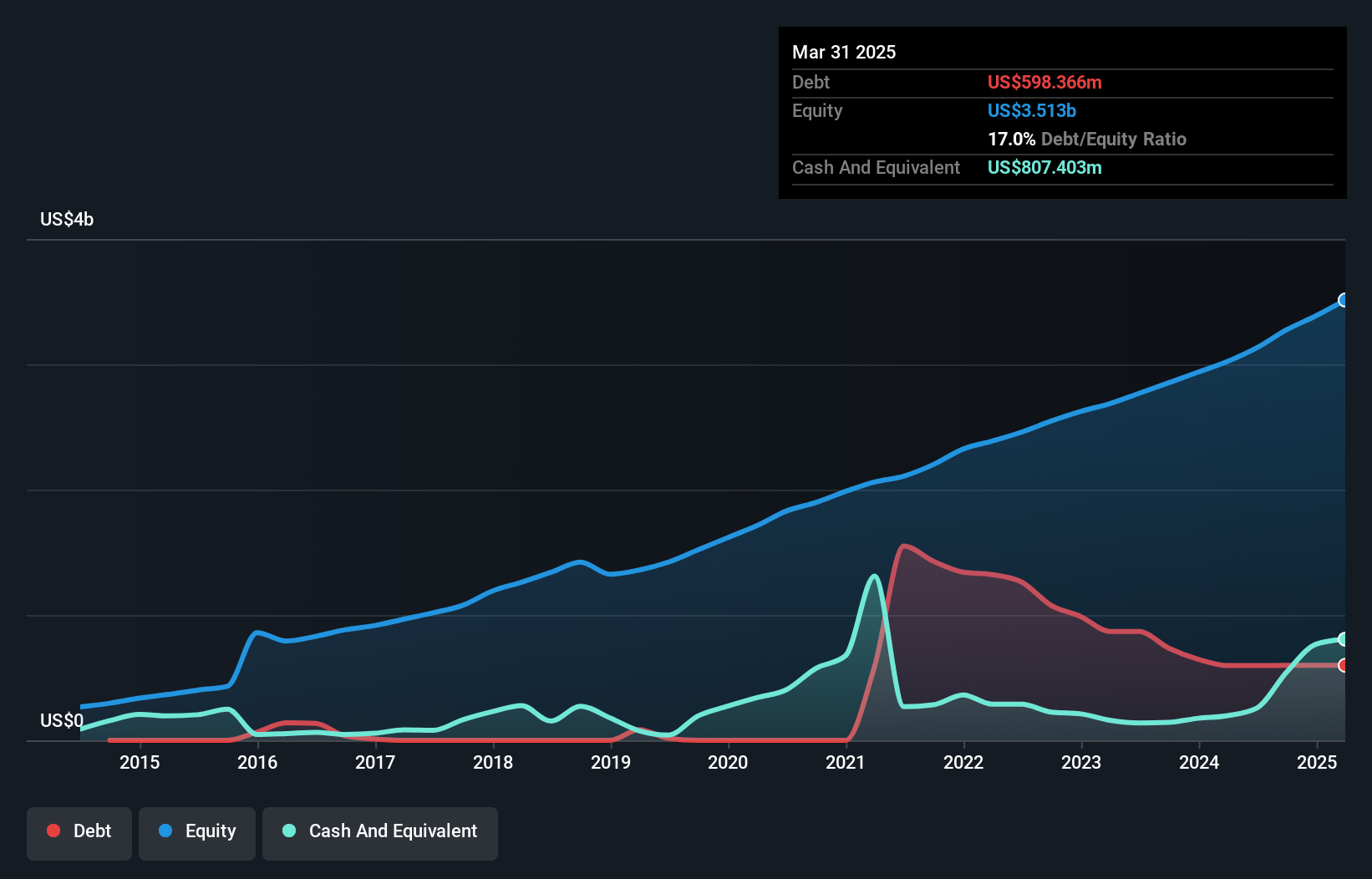
Some say volatility, rather than debt, is the best way to think about risk as an investor, but Warren Buffett famously said that 'Volatility is far from synonymous with risk.' So it seems the smart money knows that debt - which is usually involved in bankruptcies - is a very important factor, when you assess how risky a company is. We can see that Tyler Technologies, Inc. (NYSE:TYL) does use debt in its business. But should shareholders be worried about its use of debt?
Why Does Debt Bring Risk?
Debt and other liabilities become risky for a business when it cannot easily fulfill those obligations, either with free cash flow or by raising capital at an attractive price. In the worst case scenario, a company can go bankrupt if it cannot pay its creditors. However, a more frequent (but still costly) occurrence is where a company must issue shares at bargain-basement prices, permanently diluting shareholders, just to shore up its balance sheet. Of course, debt can be an important tool in businesses, particularly capital heavy businesses. When we examine debt levels, we first consider both cash and debt levels, together.
What Is Tyler Technologies's Debt?
The chart below, which you can click on for greater detail, shows that Tyler Technologies had US$598.4m in debt in March 2025; about the same as the year before. But it also has US$807.4m in cash to offset that, meaning it has US$209.0m net cash.

How Healthy Is Tyler Technologies' Balance Sheet?
We can see from the most recent balance sheet that Tyler Technologies had liabilities of US$1.56b falling due within a year, and liabilities of US$118.1m due beyond that. On the other hand, it had cash of US$807.4m and US$559.9m worth of receivables due within a year. So it has liabilities totalling US$312.2m more than its cash and near-term receivables, combined.
Having regard to Tyler Technologies' size, it seems that its liquid assets are well balanced with its total liabilities. So while it's hard to imagine that the US$25.0b company is struggling for cash, we still think it's worth monitoring its balance sheet. While it does have liabilities worth noting, Tyler Technologies also has more cash than debt, so we're pretty confident it can manage its debt safely.
See our latest analysis for Tyler Technologies
In addition to that, we're happy to report that Tyler Technologies has boosted its EBIT by 46%, thus reducing the spectre of future debt repayments. There's no doubt that we learn most about debt from the balance sheet. But it is future earnings, more than anything, that will determine Tyler Technologies's ability to maintain a healthy balance sheet going forward. So if you're focused on the future you can check out this free report showing analyst profit forecasts.
Finally, a company can only pay off debt with cold hard cash, not accounting profits. Tyler Technologies may have net cash on the balance sheet, but it is still interesting to look at how well the business converts its earnings before interest and tax (EBIT) to free cash flow, because that will influence both its need for, and its capacity to manage debt. Happily for any shareholders, Tyler Technologies actually produced more free cash flow than EBIT over the last three years. There's nothing better than incoming cash when it comes to staying in your lenders' good graces.
Summing Up
We could understand if investors are concerned about Tyler Technologies's liabilities, but we can be reassured by the fact it has has net cash of US$209.0m. The cherry on top was that in converted 156% of that EBIT to free cash flow, bringing in US$566m. So we don't think Tyler Technologies's use of debt is risky. There's no doubt that we learn most about debt from the balance sheet. However, not all investment risk resides within the balance sheet - far from it. Case in point: We've spotted 1 warning sign for Tyler Technologies you should be aware of.
At the end of the day, it's often better to focus on companies that are free from net debt. You can access our special list of such companies (all with a track record of profit growth). It's free.
Have feedback on this article? Concerned about the content? Get in touch with us directly. Alternatively, email editorial-team (at) simplywallst.com.
This article by Simply Wall St is general in nature. We provide commentary based on historical data and analyst forecasts only using an unbiased methodology and our articles are not intended to be financial advice. It does not constitute a recommendation to buy or sell any stock, and does not take account of your objectives, or your financial situation. We aim to bring you long-term focused analysis driven by fundamental data. Note that our analysis may not factor in the latest price-sensitive company announcements or qualitative material. Simply Wall St has no position in any stocks mentioned.